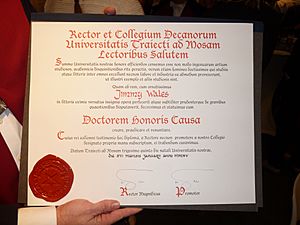Honorary degree facts for kids

An honorary degree is a special award given by a university or college. It's different from a regular academic degree because the person doesn't have to study or take exams to get it. It's given "for the sake of honor" (honoris causa in Latin) to someone who has done amazing things.
This award is usually a doctorate, which is the highest degree a university offers. Sometimes, it can be a master's degree. Universities give these degrees to honor people who have made big contributions to a certain field or to society. Even if someone hasn't gone to college before, they can still receive an honorary degree.
Contents
How Honorary Degrees Started
The idea of giving honorary degrees began a long time ago, in the Middle Ages. Universities would sometimes decide to give a degree without the usual rules. The very first recorded honorary degree was given to Lionel Woodville by the University of Oxford in the late 1470s. He later became a Bishop.
By the late 1500s, it became quite common to give these degrees. For example, when King James I visited Oxford in 1605, many people in his group received a Master of Arts degree. These were considered full degrees at the time.
In the United States, the Doctor of Philosophy (Ph.D.) degree was first given as an honorary award in 1852. Later, in 1861, Yale University was the first American university to award a Ph.D. that someone had actually earned through study. Over time, giving honorary Ph.D.s became less common. One of the last famous people to get an honorary Ph.D. was singer Bing Crosby in 1937.
How Honorary Degrees Are Given Today
Honorary degrees are usually given out during regular graduation ceremonies. The people receiving them are often asked to give a speech to the students and teachers. Universities usually pick a few people each year for these special awards. The process of choosing nominees is often kept secret until the award is officially offered.
It's important to remember that an honorary degree is not the same as a degree earned by studying and doing research. It's an honor, not a qualification that shows you completed a course. People who get honorary degrees usually wear the same special robes as those who earned their degrees.
Some universities have a special degree, like "Doctor of the University" (DUniv), just for these honorary awards. This helps show the difference between an earned degree and an honorary one.
Using the Title "Doctor"
When someone receives an honorary doctorate, they are often called "Doctor." However, it's usually suggested that they don't use the title "Dr." in everyday life. They might use it when dealing with the university that gave them the award. If they write down their degree, they should add "honorary" or "h.c." (for honoris causa) to show it's an honorary award. For example, "Dr. (h.c.)" or "Hon DMus."
Many American universities give degrees like Doctor of Laws (LLD) or Doctor of Science (ScD) only as honorary degrees. They don't have the system of "higher doctorates" that some other countries use.
Universities That Don't Give Honorary Degrees
Some universities, like the Massachusetts Institute of Technology (MIT), Cornell University, and Stanford University, have a rule not to give honorary degrees. Thomas Jefferson, who founded the University of Virginia, was probably the first to make this policy in the US. Instead of honorary degrees, some of these schools give other special awards to honor people. For example, the University of Virginia gives out Thomas Jefferson Medals.
Famous People and Their Honorary Doctorates
Many well-known people have received honorary doctorates. Sometimes, they choose to use the title "Dr." even though their degree was honorary. Here are a few examples:
- Maya Angelou: A famous writer and poet, she received many honorary degrees and preferred to be called "Dr. Angelou."
- Stephen Colbert: A comedian and TV host, he received an honorary doctorate in fine arts. He often joked about being an "honorary doctor" on his show.
- Benjamin Franklin: A scientist and founding father, he received honorary doctorates from the University of St Andrews and the University of Oxford for his scientific work. He then called himself "Doctor Franklin."
- Richard Stallman: A leader in the field of information technology, he has received many honorary doctorates from universities around the world and now refers to himself as "Dr. Richard Stallman."
- Sukarno: The first president of Indonesia, he received 26 honorary doctorates from various universities. He was often called "Dr. Ir. Sukarno," combining his honorary doctorate with his engineering degree.
See also

